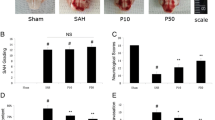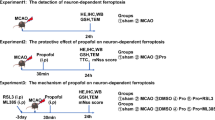Abstract
Our previous studies demonstrated that inflammatory reaction and neuronal apoptosis are the most important pathological mechanisms in ischemia-induced brain damage. Propofol has been shown to attenuate ischemic brain damage via inhibiting neuronal apoptosis. The present study was performed to evaluate the effect of propofol on brain damage and inflammatory reaction in rats of focal cerebral ischemia. Sprague–Dawley rats underwent permanent middle cerebral artery occlusion, then received treatment with propofol (10 or 50 mg/kg) or vehicle after 2 h of ischemia. Neurological deficit scores, cerebral infarct size and morphological characteristic were measured 24 h after cerebral ischemia. The enzymatic activity of myeloperoxidase (MPO) was assessed 24 h after cerebral ischemia. Nuclear factor-kappa B (NF-κB) p65 expression in ischemic rat brain was detected by western blot. Cyclooxygenase-2 (COX-2) expression in ischemic rat brain was determined by immunohistochemistry. ELISA was performed to detect the serum concentration of tumor necrosis factor-α (TNF-α). Neurological deficit scores, cerebral infarct size and MPO activity were significantly reduced by propofol administration. Furthermore, expression of NF-κB, COX-2 and TNF-α were attenuated by propofol administration. Our results demonstrated that propofol (10 and 50 mg/kg) reduces inflammatory reaction and brain damage in focal cerebral ischemia in rats. Propofol exerts neuroprotection against ischemic brain damage, which might be associated with the attenuation of inflammatory reaction and the inhibition of inflammatory genes.






Similar content being viewed by others
References
Mehta SL, Manhas N, Raghubir R (2007) Molecular targets in cerebral ischemia for developing novel therapeutics. Brain Res Rev 54(1):34–66
Tu XK, Yang WZ, Shi SS, Wang CH, Zhang GL, Ni TN, Chen CM, Wang R, Jia JW, Song QM (2010) Spatio-temporal distribution of inflammatory reaction and expression of TLR2/4 signaling pathway in rat brain following permanent focal cerebral ischemia. Neurochem Res 35(8):1147–1155
Tu XK, Yang WZ, Shi SS, Chen Y, Wang CH, Chen CM, Chen Z (2011) Baicalin inhibits TLR2/4 signaling pathway in rat brain following permanent cerebral ischemia. Inflammation 34(5):463–470
Guo Y, Xu X, Li Q, Li Z, Du F (2010) Anti-inflammation effects of picroside 2 in cerebral ischemic injury rats. Behav Brain Funct 6:43
Park JS, Shin JA, Jung JS, Hyun JW, Van Le TK, Kim DH, Park EM, Kim HS (2012) Anti-inflammatory mechanism of compound k in activated microglia and its neuroprotective effect on experimental stroke in mice. J Pharmacol Exp Ther 341(1):59–67
Chen L, Xue Z, Jiang H (2008) Effect of propofol on pathologic time-course and apoptosis after cerebral ischemia–reperfusion injury. Acta Anaesthesiol Scand 52(3):413–419
Sobrado M, Delgado M, Fernández-Valle E, García-García L, Torres M, Sánchez-Prieto J, Vivancos J, Manzanares R, Moro MA, Pozo MA, Lizasoain I (2011) Longitudinal studies of ischemic penumbra by using 18F-FDG PET and MRI techniques in permanent and transient focal cerebral ischemia in rats. Neuroimage 57(1):45–54
Xue X, Qu XJ, Yang Y, Sheng XH, Cheng F, Jiang EN, Wang JH, Bu W, Liu ZP (2010) Baicalin attenuates focal cerebral ischemic reperfusion injury through inhibition of nuclear factor κB p65 activation. Biochem Biophys Res Commun 403(3–4):398–404
Chen RM, Chen TG, Chen TL, Lin LL, Chang CC, Chang HC, Wu CH (2005) Anti-inflammatory and antioxidative effects of propofol on lipopolysaccharide-activated macrophages. Ann NY Acad Sci 1042:262–271
Sun J, Wang L, Shen J, Wang Z, Qian Y (2007) Effect of propofol on mucous permeability and inflammatory mediators expression in the intestine following traumatic brain injury in rats. Cytokine 40(2):151–156
Rodríguez-López JM, Sánchez-Conde P, Lozano FS, Nicolás JL, García-Criado FJ, Cascajo C, Muriel C (2006) Laboratory investigation: effects of propofol on the systemic inflammatory response during aortic surgery. Can J Anaesth 53(7):701–710
Tu XK, Yang WZ, Wang CH, Shi SS, Zhang YL, Chen CM, Yang YK, Jin CD, Wen S (2010) Zileuton reduces inflammatory reaction and brain damage following permanent cerebral ischemia in rats. Inflammation 33(5):344–352
Bederson JB, Pitts LH, Tsuji M, Nishimura MC, Davis RL, Bartkowski H (1986) Rat middle cerebral artery occlusion: evaluation of the model and development of a neurologic examination. Stroke 17:472–476
Lin TN, He YY, Wu G, Khan M, Hsu CY (1993) Effect of brain edema on infarct volume in a focal cerebral ischemia model in rats. Stroke 24:117–121
Li J, Han B, Ma X, Qi S (2010) The effects of propofol on hippocampal caspase-3 and Bcl-2 expression following forebrain ischemia–reperfusion in rats. Brain Res 1356:11–23
Xi HJ, Zhang TH, Tao T, Song CY, Lu SJ, Cui XG, Yue ZY (2011) Propofol improved neurobehavioral outcome of cerebral ischemia–reperfusion rats by regulating Bcl-2 and Bax expression. Brain Res 1410:24–32
Cai J, Hu Y, Li W, Li L, Li S, Zhang M, Li Q (2011) The neuroprotective effect of propofol against brain ischemia mediated by the glutamatergic signaling pathway in rats. Neurochem Res 36(10):1724–1731
Wang H, Luo M, Li C, Wang G (2011) Propofol post-conditioning induced long-term neuroprotection and reduced internalization of AMPAR GluR2 subunit in a rat model of focal cerebral ischemia/reperfusion. J Neurochem 119(1):210–219
Zhang ZG, Sun X, Zhang QZ, Yang H (2013) Neuroprotective effects of ultra-low-molecular-weight heparin on cerebral ischemia/reperfusion injury in rats: involvement of apoptosis, inflammatory reaction and energy metabolism. Int J Mol Sci 14(1):1932–1939
Feng CS, Ma HC, Yue Y, Zhang YQ, Qu XD (2004) Effect of propofol on the activation of nuclear factor-kappa B and expression of inflammatory cytokines in cerebral cortex during transient focal cerebral ischemia–reperfusion: experiment with rats. Zhonghua Yi Xue Za Zhi 84(24):2110–2114
Xu M, Yang L, Hong LZ, Zhao XY, Zhang HL (2012) Direct protection of neurons and astrocytes by matrine via inhibition of the NF-κB signaling pathway contributes to neuroprotection against focal cerebral ischemia. Brain Res 1454:48–64
Maddahi A, Kruse LS, Chen QW, Edvinsson L (2011) The role of tumor necrosis factor-α and TNF-α receptors in cerebral arteries following cerebral ischemia in rat. J Neuroinflamm 8:107
Acknowledgments
The National Natural Science Foundation of China (81100987), the Doctoral Program Foundation of Institutions of Higher Education of China (20113518120005), the Natural Science Foundation of Fujian Province of China (2011J05066), the Clinical Key Subject (Neurosurgery) Funding of Fujian Medical University, and the Key Laboratory (Neurosurgical Department) Funding from the Affiliated Union Hospital of Fujian Medical University, supported this work.
Author information
Authors and Affiliations
Corresponding author
Rights and permissions
About this article
Cite this article
Shi, Ss., Yang, Wz., Chen, Y. et al. Propofol Reduces Inflammatory Reaction and Ischemic Brain Damage in Cerebral Ischemia in Rats. Neurochem Res 39, 793–799 (2014). https://doi.org/10.1007/s11064-014-1272-8
Received:
Revised:
Accepted:
Published:
Issue Date:
DOI: https://doi.org/10.1007/s11064-014-1272-8




